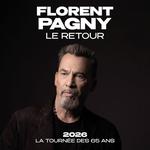
Faudel Tour Dates and Upcoming Concerts
Welcome to the official artist page for Faudel – your premier destination for
the latest concert tickets, tour announcements, and exclusive shows near you. Dive into
the music, explore the artist’s reviews and photos, and never miss another concert
moment. Stay updated, stay connected, and be the first to grab tickets for an
unforgettable musical experience.
On tour
Yes
Followers
4,084
Category
Pop
Concerts
See all upcoming events on Bandsintown and get tickets.
About Faudel
Faudel (born Faudel Belloua on June 6, 1978 in Mantes-la-Jolie) is a French singer of Algerian descent, considered the "Prince of Raï". He grew up in the suburbs of Paris, where he picked up his musical talents from his grandmother who taught him traditional Algerian music. His first public singing experience was during a family wedding celebration in Oran, Algeria. Faudel started to cover the popular tracks by Cheb Khaled and Cheb Mami at 12, after which he soon fronted the popular band "Les Etoiles du Raï". His debut album, Baida, catapulted him to fame. He has also performed with Khaled and Rachid Taha on the live album 1,2,3 Soleils. His other albums include Samra and his album Un Autre Soleil (released Sept. 2003) and, most recently, Mundial Corrida (2006).
He also has acted in a few roles, including Happenstance (Le Battement d'ailes du papillon) with Audrey Tautou.
Biography
The French music scene, long renowned as a thriving centre for world music, has now become a refuge for Algerian Rai stars. Faced with repression and death threats in their homeland, a number of top Algerian Rai stars have now set up home in Paris and launched successful international careers from France. The French capital and the surrounding suburbs have now become a rich breeding ground for young chebs seeking to emulate the examples of Khaled and Cheb Mami. Indeeilld, a whole new generation of Rai musicians are now "made in France". Rai star Faudel is typical of the New Rai Generation.
Faudel Bellula - better known to fans as Faudel - was born on June 6th 1978 in the Paris suburb of Mantes-la-Jolie, where he grew up in the Val-Fourré neighbourhood. His father, who was born in Chlef (Algeria) worked on the production line at the Renault car factory while his mother, who was also born in Algeria (in the village of Hennaya) worked as a cleaner. Faudel grew up in a highly musical environment at home. His seven brothers, all of them musicians, introduced him to soul and reggae at an early age, while his parents stocked the house with Rai cassettes.
But one of Faudel's greatest influences during his early years was his grandmother who performed regularly with the "meddahates" (groups of women musicians in Oran who play traditional music at weddings and other family occasions). It was Faudel's grandmother who was largely responsible for putting the young boy in touch with his Algerian roots and teaching him traditional Rai rhythms during the summer holidays. Faudel certainly proved to be a quick and enthusiastic learner and, by the age of 12, the talented youngster had already formed his own group, "Les Etoiles du Rai" (The Rai Stars). Faudel and "Les Etoiles du Rai" soon became a well-known fixture at the youth club and other local associations in Mantes-la-Jolie. Faudel then went on to appear at clubs throughout the Paris suburbs, performing covers of Khaled, Zahouania and Mami's greatest hits, accompanied by a pre-recorded backing tape.
The turning-point of Faudel's early career came at the age of 13 when he was spotted by Mohamed Mestar (aka Momo). Mestar, an ex-guitarist, had recently set up an association in the suburbs to promote up-and-coming local artists and, after catching one of Faudel's concerts, he offered to take charge of the young Rai singer's career. Thanks to Momo's guiding hand, Faudel soon built up his own repertoire and began performing as a support act with a number of top French music stars (including MC Solaar, Idir, Jimmy Oihid and Rai mega-star Khaled). Faudel went on to study accountancy and metallurgy, but his passion for Rai soon led to him taking up a professional singing career.
Even though Faudel was still in his early teens, he managed to establish himself as the new voice of Rai. Indeed, in 1995 two French television documentaries were made about the rising young star from Mantes-la-Jolie - "Saga cités" (which was broadcast on the state-owned channel France 3) and "Les Enfants du Rai" (broadcast on the Franco-German channel Arte). The following year Faudel would be chosen to represent the Ile-de-France region at the prestigious Printemps de Bourges Festival. And the young singer's impressive performance in the New Talent category would only serve to increase his growing popularity.
Meanwhile, Faudel embarked on a new series of concert tours while Momo set about getting his young protégé a recording deal. In order to produce the best demo tape possible, Momo and Faudel flew out to New York in January 96 to record three tracks with session musicians at the legendary Record Plant studios (graced by major American stars such as Bruce Springsteen). The demo tape would actually prove unnecessary - after Faudel's impressive performance at the Printemps de Bourges, the young star was snapped up by a leading major record label (Mercury) shortly afterwards. Faudel's original sound - which fuses traditional Arab Rai rhythms with 'new wave' guitar, reggae, Afro-beat and vibrant flamenco rhythms - was now set to hit the big time.
After signing a contract with Mercury to produce five albums over the next few years, Faudel decided to quit school (thereby realising his childhood dream of earning his own salary by the age of 18!) The young singer then embarked upon another major concert tour, performing dates throughout France and Europe. In the course of this new tour Faudel would appear in concert with a number of legendary Rai stars such as Khaled and Cheb Mami. Meanwhile, Faudel's catchy new Rai sound would reach a whole new audience when it was used as part of the soundtrack to Ariel Zeitoun's film "Elle est Belle la Vie".
Faudel soon caught on with the French media too, journalists and music critics dubbing him "Le Petit Prince du Rai" (The Little Prince of Rai). The Little Prince of Rai soon went into the studio to record his début album "Baïda" (White). Released in October 97, Faudel's album combined a "light", and extremely catchy, modern Rai style with hard-hitting lyrics. (Faudel's songs deal with everything from broken hearts to the problems of France's second-generation immigrants). The first single release from the album, "Tellement N'brick" (I Love You So Much), went on to become a huge hit on community radio during the Muslim month of Ramadan (January 98).
Following the success of "Tellement N'brick", "Baïda" was nominated in the 'traditional music' category at the "Victoires de la Musique" awards in February 97. Later that year (on April 15th) Faudel was invited to perform at the Printemps de Bourges Festival once again. Needless to say, the extracts from the young Rai star's new album met with rapturous applause from the festival audience.
Following the release of his début album, Faudel went on to perform a whole string of concerts, delighting music fans up and down the country. On September 26th the Little Prince of Rai appeared in concert with Khaled and Rachid Taha at Bercy stadium in Paris, attracting a crowd of 15,000 Rai fans. He then went on to continue his successful national tour. The live album of the Bercy concert (entitled "1.2.3. Soleils") proved to be an overwhelming success with the French public and the three Rai Tenors were soon inundated with invitations to appear on all the top TV shows.
At the beginning of '99 the popular Rai trio were back in the limelight again with a new single. They had already performed the song - an Arabic adaptation of Jacques Revaux's legendary French classic "Comme d'habitude" (the French "My Way") - at their Bercy concert and, needless to say, the single proved instantly popular with French music fans. On 20 February 1999 the trio were invited to perform the song at the 'Victoires de la Musique' (the annual French music awards) held at the prestigious Olympia. What's more, Faudel triumphed at the award ceremony that night, when television viewers voted him Best Newcomer of the Year. Following this triumph Faudel went on to bring the house down when he performed two concerts at the Olympia on March 10 and 11.
In the summer of '99 the young Rai star set off on a mini tour of Tunisia, performing six concerts which brought the famous "Faudel Tour" (the extensive international tour he had launched at the beginning of the year) to a triumphant end.
Meanwhile, Faudel's career continues to go from strength to strength as his modern Rai sound attracts a whole new following of fans. However, while Faudel is very much the 'happening young Rai star of the moment', his music should certainly not be dismissed as a passing fad. On the contrary, the lyrics of Faudel's songs are an important social comment, expressing the hopes and frustrations of a whole generation of French-born Algerians growing up in the Paris suburbs today.
1997: "Baïda"
Faudel soon caught on with the French media too, journalists and music critics dubbing him "Le Petit Prince du Rai" (The Little Prince of Rai). The Little Prince of Rai soon went into the studio to record his début album "Baïda" (White). Released in October 97, Faudel's album combined a "light", and extremely catchy, modern Rai style with hard-hitting lyrics. (Faudel's songs deal with everything from broken hearts to the problems of France's second-generation immigrants). The first single release from the album, "Tellement N'brick" (I Love You So Much), went on to become a huge hit on community radio during the Muslim month of Ramadan (January 98).
Following the success of "Tellement N'brick", "Baïda" was nominated in the 'traditional music' category at the "Victoires de la Musique" awards in February 97. Later that year (on April 15th) Faudel was invited to perform at the Printemps de Bourges Festival once again. Needless to say, the extracts from the young Rai star's new album met with rapturous applause from the festival audience.
Following the release of his début album, Faudel went on to perform a whole string of concerts, delighting music fans up and down the country. On September 26th the Little Prince of Rai appeared in concert with Khaled and Rachid Taha at Bercy stadium in Paris, attracting a crowd of 15,000 Rai fans. He then went on to continue his successful national tour. The live album of the Bercy concert (entitled "1.2.3. Soleils") proved to be an overwhelming success with the French public and the three Rai Tenors were soon inundated with invitations to appear on all the top TV shows.
At the beginning of '99 the popular Rai trio were back in the limelight again with a new single. They had already performed the song - an Arabic adaptation of Jacques Revaux's legendary French classic "Comme d'habitude" (the French "My Way") - at their Bercy concert and, needless to say, the single proved instantly popular with French music fans. On 20 February 1999 the trio were invited to perform the song at the 'Victoires de la Musique' (the annual French music awards) held at the prestigious Olympia. What's more, Faudel triumphed at the award ceremony that night, when television viewers voted him Best Newcomer of the Year. Following this triumph Faudel went on to bring the house down when he performed two concerts at the Olympia on March 10 and 11.
In the summer of '99 the young Rai star set off on a mini tour of Tunisia, performing six concerts which brought the famous "Faudel Tour" (the extensive international tour he had launched at the beginning of the year) to a triumphant end.
Meanwhile, Faudel's career continues to go from strength to strength as his modern Rai sound attracts a whole new following of fans. However, while Faudel is very much the 'happening young Rai star of the moment', his music should certainly not be dismissed as a passing fad. On the contrary, the lyrics of Faudel's songs are an important social comment, expressing the hopes and frustrations of a whole generation of French-born Algerians growing up in the Paris suburbs today.
Singing or acting?
During the summer of 2000, Faudel performed at the Summer Stage Festival in New York. Then, the young star of Raï music decided to take a new turn towards acting and accepted a part in the French film, "Battement d’ailes du papillon". Following that part, Faudel continued to read a lot of scripts, but remained on the look out for the right part that would turn him into a star of the big screen. Meanwhile, he went back to work on his next album, "Samra". Written and arranged by Nabil Khalidi (a collaborator of Rachid Taha) and Goh Hotoda (a well-known remixer), and produced by Mohamed Mestar who has been following Faudel since 1993, "Samra" remained faifthful to the raï tradition, while presenting more synthetic rhythms and Arabic pop features, as well as new Latino touches—especially for the song "Salsa raï" performed in a duo with Yuri Buenaventura. More than in his previous albums, the lyrics focused on love rather than on his usual social comments, except for one track that referred to Mantes-la-Jolie, the inner-city where the artist grew up and still lives. Released in February 2001, and following the great success of "Baïda", which topped the 350,000 mark; this new album should easily rocket to the top of the charts.
While touring to promote the album, Faudel went on with his career as an actor and took part in a television series entitled Sami. He played a Tunisian student working as a supervisor in a French high school.
In February 2002, his partner gave birth to a little girl named Enzy.
The following year, the singer went back to the recording studio to work on a new album.
On September 2nd, 2003, Faudel released "Un Autre Soleil", his most mature album so far. The artist had to compromise with his record company that insisted on his producing an exclusively Arabic album, yet he also managed to impose songs in French. With the help of songwriter Patrick Dupond who had collaborated with Florent Pagny, Faudel composed very personal lyrics such as those of "Petit Etre"—dealing with his recently-born son. Marion Michau penned the first single to be aired on the French radios "Je Veux Vivre". Bands like Zebda, the Négresses Vertes and Zen Zila also came to collaborate on the record. With a strong Mediterranean feel, the album should enable Faudel to meet with a larger and larger audience.
In 2004, Faudel made a comeback on cinema screens, starring in Merzak Allouache's film "Bab el web" alongside Samy Naceri and Julie Gayet. He played the role of a young man from the Bab el Oued neighbourhood in Algiers.
Faudel turned his attention back to his singing career soon afterwards, working on a new album called "Mundial Corrida." This, the Rai star's fourth album to date, was released in September 2006. On "Mundial Corrida", produced by Fred Chateau and Volodia, Faudel affirmed his double French and Algerian identity, celebrating his two cultures on "Mon pays", the first single release which received extensive airplay. The French singer, songwriter and composer Pascal Obispo also contributed several tracks to the album.
http://en.wikipedia.org/wiki/Faudel !
Follow on Bandsintown
Genres
Pop
Similar Artists On Tour

Cheb Mami

Magic System

Amel Bent

GIMS

Zaho

Soprano

Calogero

La Fouine

Christophe Maé

Florent Pagny

Patrick Bruel

Indochine
Faudel Tour Cities
Frequently Asked Questions About Faudel
Concerts & Tour Date Information
Is Faudel on tour?
Yes, Faudel is currently on tour. If you’re interested in attending an upcoming
Faudel concert, make sure to grab your tickets in advance. The Faudel tour
is scheduled for 1 dates across 1 cities. Get
information on all upcoming tour dates and tickets for 2026-2027 with Hypebot.
How many upcoming tour dates is Faudel scheduled to play?
Faudel is scheduled to play 1 shows between 2026-2027. Buy
concert tickets to a nearby show through Hypebot.
When does the Faudel tour start?
Faudel’s tour starts Apr 26, 2027 and ends on Apr 26, 2027.
They will play 1 cities; their most recent concert was held in
Paris at L’Olympia and their next upcoming concert
will be in at .